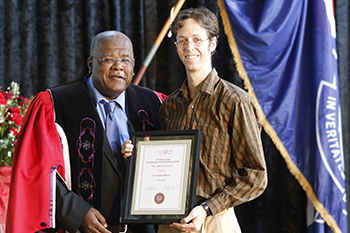Latest News Archive
Please select Category, Year, and then Month to display items
30 May 2025
|
Story Prof Mikateko Mathebula
|
Photo Supplied
 Pictured (from left to right): Prof Faith Mkwananzi, Dr Kapambwe Mwelwa, Prof Lochner Marais, Prof Chikumbutso Manthalu, and Prof Mikateko Mathebula.
Pictured (from left to right): Prof Faith Mkwananzi, Dr Kapambwe Mwelwa, Prof Lochner Marais, Prof Chikumbutso Manthalu, and Prof Mikateko Mathebula.
Through collaborative agreements with the University of Malawi and the University of Zambia, the University of the Free State (UFS) has established the Research Alliance for Higher Education in Africa (RAHEdA), a dynamic initiative aimed at enhancing research capacity and partnerships within Sub-Saharan Africa.
The collaborative agreements align with the UFS’s Vision 130 strategy in relation to internationalisation, emphasising the important role that intra-African mobility visits play in establishing relationships with universities on the continent. It also fosters knowledge exchange and engagement and allows for careful planning and strategy meetings.
“During these discussions, an ambitious but feasible roadmap was laid out for the next three to five years,” Prof Mkwananzi said. “These activities include online workshops for staff and postgraduate students at all partner institutions, and a new webinar series that focuses on profiling, advancing, and celebrating thought leaders, higher education scholars, and scholarship in Africa.”
The inaugural webinar was held on 21 May 2025. Speaker Prof Siseko Kumalo, Associate Professor at the University of Johannesburg’s Ali Mazrui Centre for Higher Education Studies, spoke on ‘Orality as the Bulwark of the Humanities?’, set the bar high for the webinar series through his compelling and original response to this timely question, as scholars around the world contemplate appropriate responses to the rise and influence of artificial intelligence in higher education teaching, learning, and assessment.
Funding to support RAHEdA has been generously provided by Prof Melanie Walker, Distinguished Professor and SARChI Chair in Higher Education and Human Development.
• For information on how to get involved and for updates on RAHEdA, please contact Prof Mikateko Mathebula at MathebulaM@ufs.ac.za
Book Prize for Distinguished Scholarship awarded to Dr Christian Williams
2016-03-24

Prof Jonathan Jansen, Vice-Chancellor and Rector of the University of the Free State and Dr Christian Williams, senior lecturer at the UFS Department of Anthropology.
Photo: Johan Roux |
When Dr Christian Williams moved from the United States to Namibia in January 2000 as part of the WorldTeach volunteer programme for teachers, he had not anticipated an award-winning piece of scholarship in his future. It was during these visits to Namibia, though, that the seeds for his highly-acclaimed book were sewn.
While volunteering at the St. Therese Secondary School in Tses at that time, Dr Williams – now a senior lecturer at the University of the Free State (UFS) Department of Anthropology – became acquainted with some of the school’s alumni. The stories these individuals started sharing with him soon revealed personal histories of exile and violence by fellow SWAPO (South West Africa People’s Organization) members.
These experiences ultimately resulted in Dr Williams’ book, National liberation in postcolonial southern Africa: a historical ethnography of SWAPO’s exile camps, published last year. Due to the book’s literary impact, the university awarded Dr Williams the UFS Book Prize for Distinguished Scholarship on Friday 19 February 2016. Dr Williams is the second academic to be awarded this prize.
Politics of the past
In the 1960s, Namibians mobilised and retaliated against colonial rule under the liberation movement known as SWAPO. This created political tension which resulted in the flight of many SWAPO members to exile camps administered by the party.
“Over its three decades in exile, SWAPO was responsible for the welfare of roughly 60 000 Namibians. This was about 4% of the total Namibian population at independence – most of whom lived in camps,” says Dr Williams. The research originally used as a basis for his doctoral thesis was subsequently developed into this prize-winning book.
Advancing the Human Project
“It’s an honour to receive recognition from the university; it means that they value the kind of work that I am doing. I think it’s great for universities to have such prizes,” Dr Williams says.
Supporting the UFS Human Project, Dr Williams will donate a portion of the R25 000 prize money towards the UFS Student Bursary Fund Campaign, as well as the school in Namibia.The rest will subsidise the purchase of the book for distribution to libraries and as gifts.